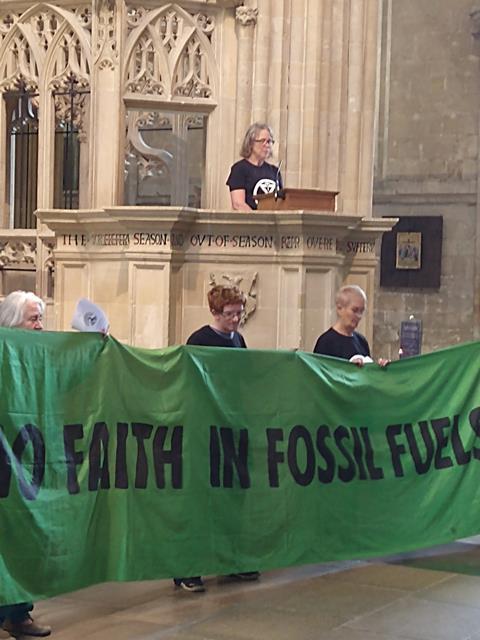Why would ten Christians, including a retired Anglican priest, disrupt a Sunday Eucharistic service at Wells Cathedral?
As members of Christian Climate Action, we have thought carefully about how to carry out this action in a prayerful and respectful way. After receiving Communion, we walked down the aisle singing the final hymn and faced the congregation holding banners with the words: “No Faith in Fossil Fuels” and “Churches Divest Now”. A member of our group then came up to the pulpit to explain why we were there: to call on Church of England dioceses – including Bath and Wells – Church Commissioners and the Pensions Board to commit entirely in the divestment of fossil fuels.
It is heinous that the Church continues to support and profit from the investment in these killers
We all had our personal reasons for participating in the demonstration; Karen Grattage, mum-of-one and churchwarden of the Diocese of Bath and Wells, said: ‘I am really worried about the future of my child and other people’s children. I think people don’t realize that churches are still investing in companies that are destroying the planet and I want that to change before it’s too late.
Retired teacher Liz Rosser gave her reasons: “Fossil fuels are killing us. We are facing the collapse of everything we know and love. People are dying and losing their homes to greenhouse gases in the atmosphere, caused primarily by the burning of fossil fuels. It is heinous that the Church continues to support and profit from investing in these killers. We have alternatives. Let’s invest in those.
And Phil Manning, in training for ordained ministry at Trinity College, who took part in the protest outside the cathedral, said: ‘I am joining this action because the Church of England badly needs to put its money there where is his mouth to declare that we are in a climate emergency. The Church affirms that caring for creation is part of our mission in the world…and yet, despite the fact that fossil fuels have long been proven to harm our world, it continues to invest and therefore participate to this destructive practice.
The biggest challenge we face

Archbishop Justin Welby says it very clearly: “Climate change is the greatest challenge facing us and future generations.” And the inconvenient truth is that, despite governments and major institutions accepting the reality of the climate emergency, carbon emissions continue to rise – and 86% come from the burning of fossil fuels. In May 2021, Fatih Birol, Executive Director of the International Energy Agency, said The Guardian“If governments are serious about the climate crisis, there can be no new investments in oil, gas and coal, from now – from this year.”
The current fuel crisis, exacerbated by the Russian invasion of Ukraine, presents the Church of England with an opportunity – and a moral decision. Continue funding the fossil fuel industry, which is profiting from the crisis and committed to increasing oil and gas extraction; or divest immediately, focusing on developing clean alternatives to fossil fuels.
As UK citizens suffer from fuel poverty, twelve CofE dioceses, Church Commissioners and the Pensions Board are continuing to invest around £55million in companies like Shell, which in March cynically bought a cargo of Russian crude oil at a knockdown price, as other companies shunned Russian supplies.
An estimated 35% of all commitments to divest from fossil fuels globally have been made by faith-based institutions, more than any other sector. This is good news and something to be proud of. But we must go further. This week, the Synod is voting on a path to net zero by 2030. We urge the Church to also announce its intention to fully divest from fossil fuel companies and fully divest by the end of October 2022, before the international meeting on climate change in Egypt (COP27). Humanity is running out of time and the Church must be a prophetic voice!